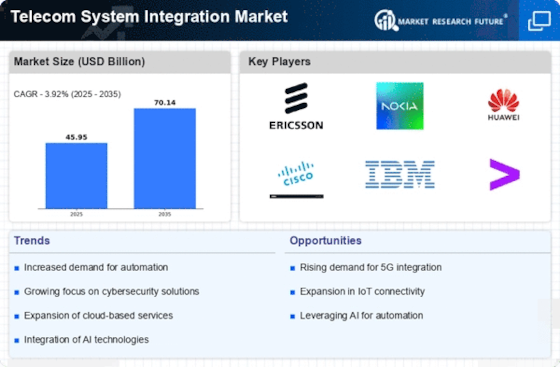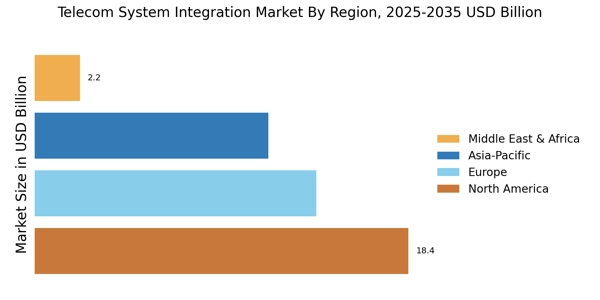Adoption of 5G Technology
The rollout of 5G technology is a pivotal driver for the Telecom System Integration Market. With its promise of ultra-fast data speeds and low latency, 5G is set to revolutionize various sectors, including healthcare, automotive, and entertainment. The integration of 5G networks requires sophisticated system integration solutions to manage the complexities associated with this new technology. Market data suggests that the 5G infrastructure investment is projected to reach over 1 trillion by 2025, highlighting the urgency for telecom operators to adopt integration strategies that can support this transition. As businesses leverage 5G capabilities, the demand for seamless integration of existing systems with new 5G networks will likely escalate, further propelling the growth of the telecom system integration market.
Emergence of Smart Cities
The emergence of smart cities is a transformative trend impacting the Telecom System Integration Market. As urban areas evolve into smart ecosystems, the demand for integrated telecom solutions that support various applications, such as smart transportation and energy management, is on the rise. This trend necessitates the seamless integration of multiple systems, including IoT devices, communication networks, and data analytics platforms. Market analysis indicates that investments in smart city initiatives are expected to exceed 2 trillion by 2030, creating substantial opportunities for telecom system integrators. By providing comprehensive integration solutions, telecom companies can play a pivotal role in the development of smart cities, thereby driving growth in the telecom system integration market.
Shift Towards Digital Transformation
The shift towards digital transformation is a significant driver in the Telecom System Integration Market. Organizations across various sectors are increasingly adopting digital technologies to enhance operational efficiency and customer engagement. This transformation necessitates the integration of legacy telecom systems with modern digital solutions, creating a demand for specialized integration services. Data suggests that over 70% of enterprises are prioritizing digital transformation initiatives, which often require complex system integrations. As businesses seek to leverage data analytics, cloud computing, and AI, the role of telecom system integrators becomes crucial in facilitating these transitions. This trend not only fosters innovation but also propels the growth of the telecom system integration market as companies invest in comprehensive integration strategies.
Increasing Demand for Enhanced Connectivity
The Telecom System Integration Market is experiencing a surge in demand for enhanced connectivity solutions. As businesses and consumers alike seek seamless communication experiences, the integration of various telecom systems becomes paramount. This demand is driven by the proliferation of mobile devices and the need for reliable internet access. According to recent data, the number of mobile subscriptions has surpassed 8 billion, indicating a growing reliance on telecom services. Consequently, telecom system integrators are tasked with developing solutions that ensure interoperability among diverse platforms, thereby facilitating improved connectivity. This trend not only enhances user experience but also drives revenue growth for telecom operators, as they invest in advanced integration technologies to meet customer expectations.
Regulatory Compliance and Security Concerns
In the Telecom System Integration Market, regulatory compliance and security concerns are increasingly influencing integration strategies. As telecom operators navigate a complex landscape of regulations, the need for robust integration solutions that ensure compliance with data protection laws becomes critical. The rise in cyber threats has heightened the focus on security, prompting telecom companies to invest in integrated systems that safeguard sensitive information. Recent statistics indicate that cyberattacks on telecom networks have increased by 30% in the past year, underscoring the necessity for secure integration practices. Consequently, telecom system integrators are tasked with developing solutions that not only meet regulatory requirements but also enhance the overall security posture of telecom networks.

















